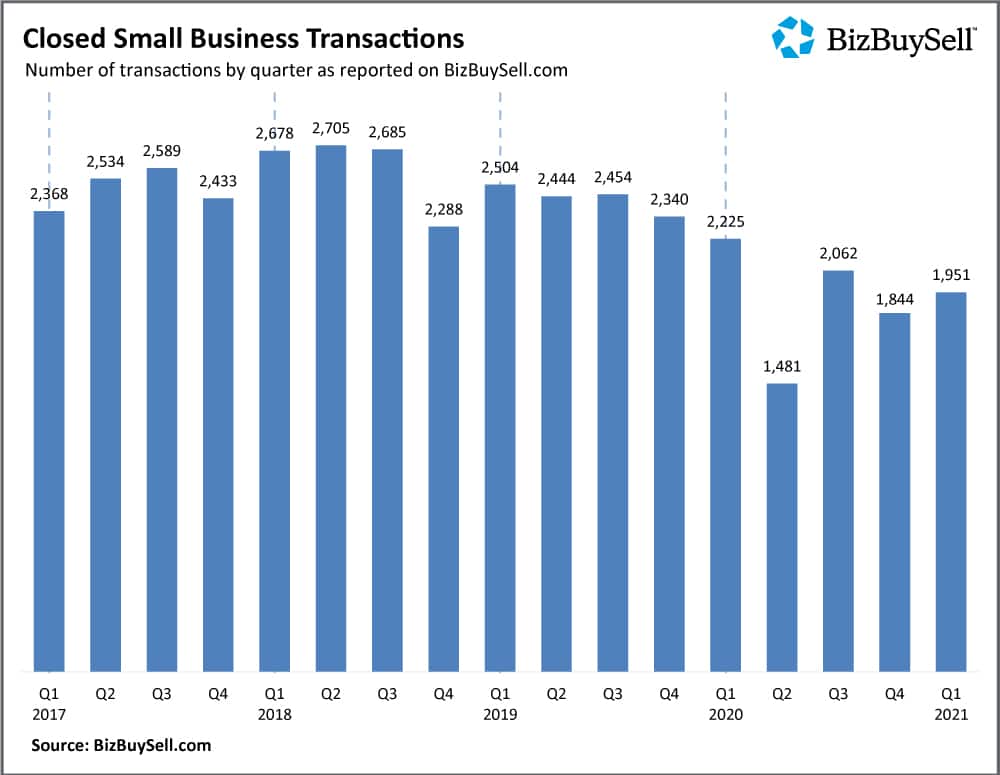It seems we’re still unpacking all of the changes that are continuing after 2020. The pandemic seems to have prompted a crow’s feet domino effect, with branches and branches of shifting. How we interact socially has changed, entire industries have faced a survival-of-the-fittest scenario, and a lot of things still remain uncertain.
Even amongst so much uncertainty, the outlook is pretty bright for M&A at the moment. Private Equity firms are flush with cash, interest rates are low, and with the distribution of COVID-19 vaccines, we can expect an increase in overall stability, slowly but surely. We saw in 2020 that M&A started strong, and then went on a brief hiatus starting in March when things began shutting down. By July-August, however, M&A took off with renewed vengeance, especially as buyers were hungrier and sellers were cautious, so there was higher demand than supply.
According to Bizbuysell’s latest Insight Report, sale prices have boomed 30% amid rising multiples due to this increased demand. There’s especially been a boost in demand for what we now consider to be “essential” businesses–the companies that were exempt from mandatory shut downs. “Among these resilient businesses,” mentions the Insight Report, “brokers most commonly mention liquor stores, convenience stores, fast food restaurants, pizzerias, gas stations, construction and home improvement businesses, e-commerce sites, medical businesses, manufacturers, and distributors as most in demand.”
This trend of M&A taking off has continued through 2021, and we don’t expect it to taper off quite yet. In fact, with President Biden’s tax changes up ahead, we’d say that if you want to sell, you’re better off aiming for sooner rather than later, in order to avoid the increasing taxes for high-income earners and businesses.
The Biden administration has expressed their intention to increase taxes on high-bracket incomes at some point during the next four years. We don’t yet know specific parameters, and without a more set time frame, this doesn’t make it easy to plan for the long term. What we do know is that middle-market business owners who are planning to sell in the next few years ought to seriously consider moving up their timeline, or else they may find themselves paying much higher taxes once these changes take effect.
In order to expedite economic recovery, Biden is planning on utilizing a $1.9 trillion relief package. In addition, the President has announced his Build Back Better plan, which will involve higher taxes paid by high earners and corporations.
| Business Tax Proposals under consideration (may be subject to change) |
|
|
|

| Individual Tax Proposals under consideration (may be subject to change) |
|
|
|
President Biden is also proposing to undo many of the tax deductions put in place through the 2017 Tax Cuts and Jobs Act. Most of the TCJA provisions are due to expire in 2025, but a few of them will end sooner, which you’ll want to take into consideration if you’re thinking of selling your company in the near future. These sunsetting provisions will most likely make it worth your while to sell sooner rather than later. These are:
Immediate deduction of R&D expenses. Through the rest of 2021, business owners can immediately deduct their research and development costs. After this year, immediate deduction will be replaced by 5-year amortization.
Phase down of bonus depreciation. With bonus depreciation, business owners can deduct a percentage of the cost of their assets the year those assets are acquired, rather than depreciating them over a longer period. The TCJA allows 100% deduction of some assets. However, after 2022, these bonus depreciations will decrease by 20% each year until they’re down to zero in 2027.

According to Max Friar, co-founder at Small Business Deal Advisors, “What we’ve seen over the last year is that due to an overall low number of businesses available for sale, particularly among the stable and solid performers, demand and valuations are very strong. Now is a good time for those strong performers to end on a high note, particularly if they’re approaching time to retire or pursue other ventures.”
Overall, the M&A market in 2021 looks strong. Interest rates are low, Private Equity demand is high, strategic acquirers are on the prowl, and individual buyers spurred by unemployment, are throwing their hats in the mix. What all these tax changes mean is that if you’re already planning on selling your company within the next few years, it’d be worth your while to speed up that process and get on the market now. Even if you’re hoping to increase valuation over the next three to five years, it’s highly possible that the taxes you end up paying through that time will outweigh whatever you gained through valuation.

